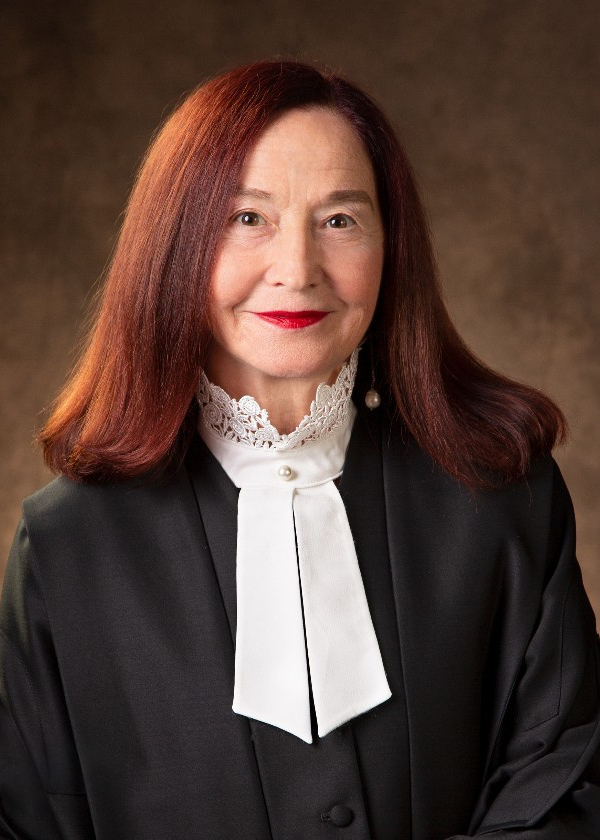Long-time champion of human rights Justice Sheila Greckol to receive honorary doctorate
Doug Johnson - 21 November 2023

The University of Alberta will bestow an honorary degree on notable Faculty of Law alumna and champion of social justice, the Hon. Sheila Greckol.
In recognition of her long-standing commitment to social justice, her support of the Faculty and her much-lauded career, Greckol will receive an honorary doctor of laws degree on Nov. 22, during fall convocation.
Greckol says she is “very honored to receive an honorary degree,” from her alma mater in recognition of a career that has had a large impact on law both in and outside of Canada.
“The Faculty of Law is enormously proud to count Justice Sheila Greckol among our most accomplished alumni and we are very pleased that she is being recognized with this honorary degree,” says Dean Barbara Billingsley of the Faculty of Law.
“She has been unfailingly passionate about her work, true to her convictions, and generous in sharing her time and expertise with law students, including several years in the 1990's when she served as a sessional instructor at the Faculty of Law,” says Billingsley. “She has been a great friend to the Faculty of Law, to the University of Alberta and to the legal community for many years. She is most deserving of this honorary degree.”
Douglas R. Stollery CM, KC, former chancellor of the U of A and Faculty of Law alumnus, graduated a year after Greckol. After a chance meeting at a rally in the 1990s, Stollery and Greckol ended up as co-counsel on a landmark case that had a huge impact on 2SLGBTQ+ rights in Canada.
“She’s a human rights and social justice champion,” Stollery says.
Greckol grew up in the small town Vilna, Alta., before pursuing her studies at the U of A. She graduated from the Faculty of Law in 1975, before working as a labour and human rights lawyer for 25 years.
In 2001, she became a justice of the Court of the Queen’s Bench of Alberta. Then, in 2016, she was appointed as a justice of the Court of Appeal of Alberta, a position she held until her retirement in 2022
“For me, the practice of law was about using legal principles to advance the course of justice. I tried very hard to always maintain those ideals when working as a judge,” says Greckol. “Over the years I was in the justice system, Canadian Courts have issued so many decisions affirming that equality is at the heart of justice. We see this in decisions that affect disadvantaged groups, that affect women, that affect Indigenous people. I was fortunate to have the opportunities to work in such a system.”
During her time as a human rights lawyer, she took on several cases that advanced human rights in the province in relation to issues such as mandatory retirement, paid pregnancy leave, 2SLGBTQ+ equality rights and many others.
“Over the course of her career as a practicing lawyer and as a justice of Alberta's trial and appellate courts, she has set an inspiring example of how a legal education can be marshalled to empower others and to transform the law and society in meaningful ways,” says Billingsley.
Vriend v. Alberta
One of Greckol’s biggest achievements came in 1998 with her work in Vriend v. Alberta. The case concerned a gay man, Delwin Vriend, who was fired from his teaching job on the basis of his sexual orientation. At the time, the human rights legislation afforded no protections against sexual orientation discrimination.
The case involved the issue of whether that failure constituted an unjustified breach of the Charter of Rights and Freedoms. Greckol got involved because of her past working on discrimination cases and with the AIDS Network in the 1980s.
“I was well aware of the systemic discrimination against people in the 2SLGBTQ+ community,” she says.
Greckol put together a team of lawyers, including Stollery, and collaborated with numerous like-minded organizations. She took the case all the way up to the Supreme Court of Canada, which ruled in Vriend’s favour. This was the first successful gay rights case before the Supreme Court of Canada. That court ruled that the failure to provide protection against sexual orientation discrimination was unconstitutional and “read in” those protections into Alberta’s human rights legislation.
“The success of the case really was very much the product of engagement within and by the community itself, with leaders too numerous to mention here,” Greckol says.
Stollery notes that the Vriend case made a huge impact both in Alberta and beyond. It was the basis for many cases in Canada involving people’s rights and protections against discrimination on the basis of sexual orientation, he says.
“Sheila and I worked extremely closely on the case. And we have been very, very good friends ever since,” Stollery says.